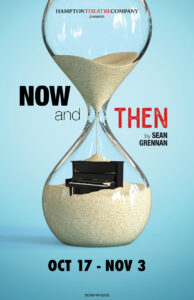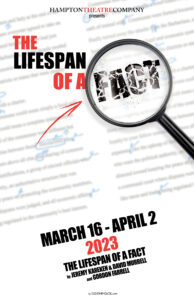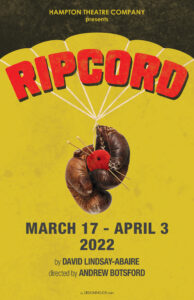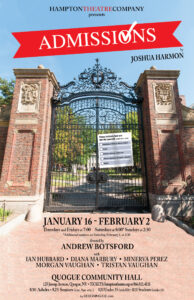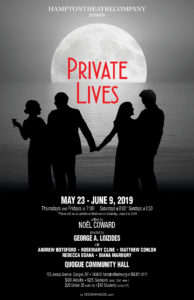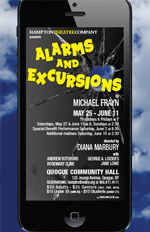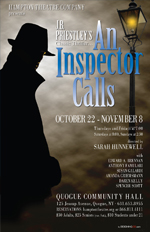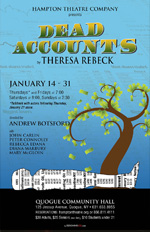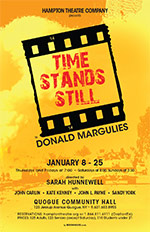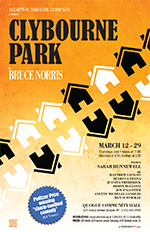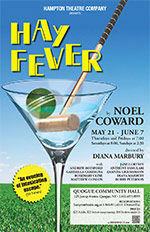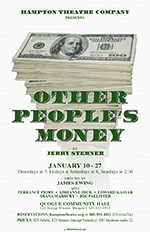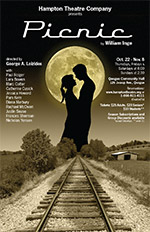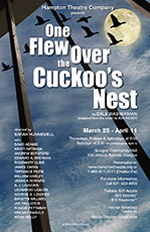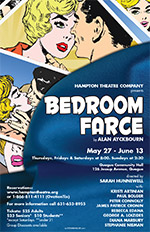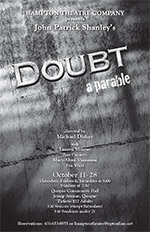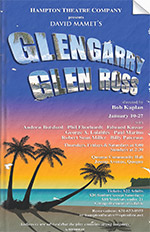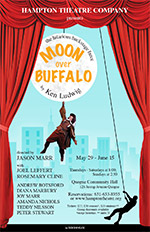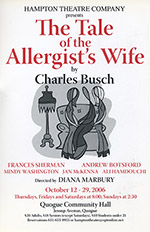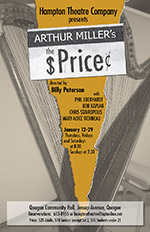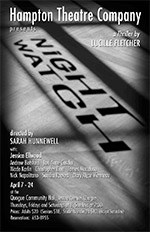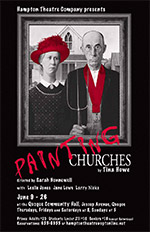About
Information to make your visit more enjoyable.
QUOGUE COMMUNITY HALL 125 Jessup Avenue Quogue, NY 11959 631.653.8955CELEBRATING 40 YEARS

It all started in 1984, with a conversation around a kitchen table in Quiogue. Rosemary Cline still remembers her (then mother-in-law) June Ewing and June’s son Jimmy talking with their friend Jim Irving about the idea of starting a theatre company. The plan was to gather like-minded individuals with an interest, training or experience in making live theatre, and then choose worthy plays and mount productions. That was the seed, nurtured with love and tremendous creative energy by June and others, that eventually bloomed into the first production of what was then known as the Westhampton Community Theater: “The Diary of Anne Frank.” Rosemary had her first role with the company (of many over the years) as Miep in that very first show, staged in the Westhampton Elementary School in 1985, and went on to take roles in almost all of the plays of the company’s first six years.
Gary Hygom, now the executive director of the Suffolk Theater in Riverhead (and husband of HTC board member Mary Powers Hygom), was one of the first people approached by “the two Jims.” As he recalls, “I agreed to join them and help get things moving. Our tech crew was made up of friends and family: Peter Marbury and Jimmy Ewing worked on building, painting, lighting … everything. We were very much a community theater; we worked and went out together: the Plitt family, the Marburys, Jimmy, Robby Thornton and others.”
The Marbury family played a key role in building the company and sustaining it over the years. Peter Marbury and Jimmy designed and built almost all of the sets in the company’s first three decades. Diana Marbury, whose first role with the company was in “Hot L Baltimore” in 1986, went on to take part in almost every production: whether as an actor, set dressing, or gathering furniture and props. She moved into directing in 1999, and also held the post of artistic director for a number of years.
Diana made sure that others in her and Peter’s family contributed as well: son Sascha providing artistic and fabrication support; son Sebastian providing artistic support in poster design as well as acting; and son Sean taking a few roles in different shows and helping with set construction. After Peter’s untimely death in 2009, Sean took on his father’s mantle and became, initially with Jimmy, the principal set designer and builder until 2020. Another formative influence in the early years was Jane Stanton, who directed the company’s third production, 1986’s “Bedroom Farce,” and went on to become the company’s de facto resident director. She helped choose virtually every show for the first ten seasons, as well as the plays that she would direct in the seasons that followed, when other directors stepped up to help shoulder the load.
A professional with years of directing experience at every level, Jane had a gift for putting together seamless ensembles from casts that had widely different levels of experience, training and talent. In those early years, primarily with Jane as director, the company started building and burnishing a reputation for high-quality productions and a level of professionalism that set it apart from typical community theatres.
So it made sense that by the time it landed happily in its beautiful home at the Quogue Community Hall with “Anastasia” in the fall of 1987, the company had changed its name to the Hampton Theatre Company. In 1990, Jane invited Sarah Hunnewell – a member of the Snarks theatre troupe in NYC – to act in the company’s (first) production of A.R. Gurney’s “The Dining Room.” The experience led Sarah to return again and again; she bonded especially with Jimmy Ewing, and the two became a couple. After June Ewing died in 1992, it seemed fitting that Sarah and Jimmy should step into leadership roles; Sarah became HTC’s executive director, a post she held until she retired from the company in 2017, with Jimmy continuing as a board member, actor, director, creative contributor and set designer and builder. It’s hard to overstate the impact of Sarah’s tenure with the company. When she started, tickets were general admission and sold either at Lynne’s Cards and Gifts (board member Lynne Jones’s Westhampton Beach mainstay) or at the door. Salaries, except for each show’s director, were nonexistent. There was no fundraising; proceeds from ticket sales went toward buying lumber for the next production. Compare that with what the Hampton Theatre Company is now: a professional non-profit regional company with a vibrant interactive website, online ticket sales for assigned seating, playbills, and a year-round salaried general manager and bookkeeper. There’s pay for everyone who works on a show: not only the director, but all the designers, tech crew, carpenters, stage managers and actors. To augment revenue from ticket sales and playbill advertising, the HTC now utilizes an extensive snail mail and email database to support a series of robust fundraising initiatives and show promotion. Fundraising is critical, of course, because the professional status of the company and the high quality of HTC productions would not be possible without the generous support of patrons and donors.
Sarah needed help and support from everyone involved to shepherd the transition, but the HTC never could have entered the digital age or become the respected professional company that it is today without her commitment and determination.
On stage and off, the HTC has benefited from a long line of theatre people in addition to the Marburys who have come on board and stayed with the company. Andrew Botsford was invited by Jimmy Ewing to act in the company’s second production in 1985, and over the last 40 years he has appeared in more than 50 plays, worked backstage, held various positions on the board of directors and advisory board, drawn on his experience in journalism to oversee the company’s communications, and directed and produced.
Based on the company’s divergence from the standard nonprofit organizational model as well as the advisory board’s recommendations for greater sustainability, after Sarah Hunnewell’s retirement the position of executive director was eliminated. Andrew was elected president of the board and – together with his longtime collaborator and fellow founding member Rosemary Cline, who was elected vice president – started working toward systematizing all of the HTC’s operations.
The idea was, and is, to ensure that no single officer or member of the all-volunteer board would ever be responsible for an outsize portion of all the component duties required to keep the company operating efficiently, while still maintaining the high standard of production values that sets the HTC apart. As with Sarah, the value of Andrew and Rosemary’s contributions has been immeasurable. There would simply be no Hampton Theatre Company as it is known today on the East End without Andrew or Rosemary.
The same can be said of George Loizides, a longtime LI high-school drama teacher and director who spent years as a creative force at Bellport’s Playcrafters theatre troupe before landing at HTC in the cast of “Glengarry Glen Ross” in 2008. George has been indispensable to the theatre ever since, bringing an infectious enthusiasm to everything he does, from acting and directing, to designing and building sets, to fabricating and rummaging for props and vintage furniture at yard sales and thrift shops with his wife Kathy. George has also taken on the important work of administering the Diana and Peter Marbury Scholarship program, which has reaped huge rewards for the HTC and the live theatre community over the years
Upon his retirement from HBO in 2019, Quogue resident and longtime HTC fan Roger Moley immediately started pitching in, designing and creating projections for “Ken Ludwig’s Baskerville: A Sherlock Holmes Mystery.” He helped the company through the early challenges of Covid and was formally invited to join the board in 2021. Since then he has become a key player, taking on a wide range of responsibilities: serving as rehearsal stage manager, co-directing with George and then Andrew, serving as music director for the holiday radio plays, assuming responsibility for all PR and communications, wrangling set furniture and props, and also producing, most recently for “Now and Then” in fall 2024. Elected president of the board in 2022, Roger has substantially broadened HTC’s outreach and profile, and continues to collaborate with Andrew and Rosemary on the sustainability work they started in 2017.
* * * * *
Continuity has always been one of the keys to the company’s growth. The through line of support from the Ewing family can be seen in June’s three grandchildren – Eliah Ewing and his wife Andrea, Jennifer Ewing Tatanelli Brancatelli, and Chloe Ewing Tatanelli Bento – joining the first class of the June C. Ewing Producers Circle in 2018, with Eliah pledging a lifelong commitment.
Onstage and off, the HTC has been shaped over the last 40 years by passionate advocates of live theatre, several of whom have been connected since the early years. Gary Hygom met his future wife Mary Powers working backstage on “Hot L Baltimore” in 1986; both worked steadily at the theatre in various capacities for several years before moving on. After a lengthy absence, both were coaxed to return: Gary to design the set for “Native Gardens” in 2021, and Mary, now a board member, to direct two plays in 2024: “Strictly Murder” and “Now and Then.” The couple’s daughter Grace, now a college sophomore, started working backstage while still in high school, and was the production stage manager for last year’s “A Funny Thing Happened on the Way to the Forum,” perhaps the HTC’s most ambitious production ever.
The late John Howard’s first show with the company was “God’s Favorite” in 1987; since then his daughters Siri and Joanna have both had roles in HTC plays. His wife Linda provided musical guidance for non-musical shows that required singing; and his daughter Jessica has worked backstage and acted in many productions over the years (most recently playing Domina in “Forum”). Jessica met her future husband, Seamus Naughton, during rehearsals for “Lady Windermere’s Fan” in 1998. Seamus had started working backstage for the company that year on its first production of “Sylvia”; he helped with set building and stage managing before becoming the company’s resident sound designer and audio engineer – a position he held until his untimely death in 2023.
Sebastian Paczynski first designed lighting for HTC for the company’s production of “Summer and Smoke” at Guild Hall in East Hampton in 2003. He installed a new lighting package in Quogue and designed the lighting for “Proof” in 2003, and has been the lighting designer for all HTC shows since then. In 2019, he proposed and won board approval for a major investment in LED theater lighting, making the HTC, after installation, one of the first theatre companies on Long Island to effect the transition. The capabilities of the new system were first displayed to glorious effect in “Man of La Mancha” in 2019, and have enhanced all the productions since then. Terry Brennan, the wife of actor, directo
r and former board member Ed Brennan, was first hired as general manager in 2016, and in the years since she has brought the company forward in more effective and efficient organization, improved branding and messaging, and superior customer service. Bookkeeper Julie Stark, with the help of board member and former treasurer Lulie Morrisey, has managed to keep the increasingly complex accounts in good order, earning high marks for the company at each annual audit.
Teresa LeBrun began helping HTC’s original costume designer Chuck Roeder in 1986, and has designed costumes for all the company’s productions since 2005. Julia Morgan Abrams first joined the company as house manager for the 2008-2009 season and has been supervising volunteers, organizing concessions and greeting patrons for every production ever since.
The list goes on. Joe Pallister’s first role with the company was in “A Streetcar Named Desire” in 1998. While he continues with his acting career in different venues and media, he still manages the HTC website and his company, DESIGNINGJOE, does all the HTC’s graphic design – including the artwork for the poster and the cover of this program. AEA member Matthew Conlon (Don Quixote in “Man of La Mancha,” among many other roles) first appeared on stage in Quogue in “The Heiress” in 1994, and has continued to act and sometimes work on sets with the company up to the present day.
Add to this cast of characters the many other actors, directors, and crew members and theatre advocates who have helped shape the company’s identity over the years, including, to name only a few: Jane Lowe Baldwin, Bob Blaisdell, Chrissie DePierro, Carolann Di Pirro, Rebecca Edana, Ed Brennan, Phil Eberhardt, Jessica Ellwood, Gail Gambino, Ed Kassar, Tom Leo, Jean Plitt, Mary Alyce Vienneau, Morgan Vaughn, John Zaleski and current board members Amanda Griemsmann, Terrance Fiore, Catherine Maloney, and Betsy Webb Rowe.
* * * * *
A shared passion for creating live theatre of the highest quality by these and many other contributors has fueled the success of the Hampton Theatre Company over the past four decades. That’s not to say there haven’t been challenges. A necessary major renovation of the Quogue Community Hall that took almost four years to complete led to a nomadic stretch for the HTC: the company staged 10 shows at the Westhampton Beach Performing Arts Center and Guild Hall in East Hampton from 2000 to 2004. More recently, during the Covid pandemic, the HTC painstakingly adopted the necessary protocols to allow it to reopen its doors – at first to spaced-apart audiences at one-third of house capacity – to live audiences in 2021. The company stayed the course, following the law and requiring proof of vaccination from faithful patrons, when many small regional companies around the country were forced to go under.
HISTORY
In 1985, the HAMPTON THEATRE COMPANY began life on a shoestring and a dream at the Westhampton Beach Middle School with its first production, THE DIARY OF ANNE FRANK. The company has come a long way since its founding in 1984 by James Ewing, James Irving and June Ewing, when the company had no theater, no audience, no board of directors and no capital and performed in such dramatic venues as a tent pitched behind the Masonic Temple on Montauk Highway in the midst of an August hurricane.
Thanks to the generosity of the Village of Quogue, in 1987 the company found a permanent home at the beautiful Community Hall. There, and at other venues, the company has produced more than 100 plays by a wide variety of major playwrights. Information about the productions can be found in the PAST PRODUCTIONS tab below, or on our PAST PRODUCTIONS page.
The Hampton Theatre Company today fills a unique niche in the Long Island performing arts landscape. From its start as a small community group bound together by a love of live theater, it has grown into a successful professional company: one that is still dedicated to the original dream of the founders and still proud to draw its talented performers and technical expertise primarily from the surrounding area, in order to present the very best in live theater in the fall, winter and spring on Long Island’s East End.
DIRECTIONS
FROM SUNRISE HIGHWAY (ROUTE-27):
Sunrise Highway (Route 27) to exit 64S (Rte. 104 to Quogue). Rte. 104 South (approx. 3 miles) to Montauk Highway (Rte. 80). Right onto Montauk Highway. Turn left on Lamb Avenue (a quarter mile before Otis Ford and Jessup Avenue traffic light); take a right turn on Midland Street; go past the Post Office and cross Jessup Lane into the Village parking lot behind the Quogue Firehouse.
FROM MONTAUK HIGHWAY (ROUTE-80): Approaching Quogue on Montauk Highway from the west, turn right on Quogue Street; make left turn onto Willow Lane (one block before Jessup Avenue); proceed straight past Village Lane and turn right at the entrance to Village parking lot.
FROM MONTAUK HIGHWAY (ROUTE-80): Approaching Quogue on Montauk Highway from the west, turn right on Quogue Street; make left turn onto Willow Lane (one block before Jessup Avenue); proceed straight past Village Lane and turn right at the entrance to Village parking lot.
PARKING & ACCESSIBILITY
PARKING: There is limited street parking around the theater as well as a parking lot that can be entered just north of the Quogue Community Hall.
WHEELCHAIR ACCESS: The theater is wheelchair accessible through the side entrance. If a member of your party needs wheelchair access, please come to front entrance and ask the person taking tickets to open the side door. If a member of your party requires a wheelchair in the theater, please reserve one seat at the end of a row.
ASSISTED LISTENING DEVICES: The theater does not have assisted listening devices at this time.
ASSISTED LISTENING DEVICES: The theater does not have assisted listening devices at this time.
THEATRE POLICIES
ARRIVAL
The theater will open 30 minutes prior to showtime; patrons are asked to arrive approximately 30 minutes prior to the performance so that all ticket holders may be seated in a safe and timely manner. There is ample parking in the Village lot behind the theater and the firehouse and on the street. Latecomers arriving after the performance has started may be seated in the rear of the theater.
CELL PHONE & CAMERA USAGE
Hampton Theatre Company asks that you turn off or silence all noise-making electronics, text-messaging devices and cell phones during the performance. Taking pictures and video recording is prohibited inside the theatre.
CHILDREN
No Children under the age of 5 are permitted in the theater. All persons entering the theater must have a ticket. Please carefully consider whether a performance is appropriate for your child before planning to attend. Also, please be aware that disruptive patrons, including children, will not be allowed to remain in the theatre.
DRESS CODE
Hampton Theatre Company has no formal dress code: although shirt and shoes are required at all times. In addition, please consider the effects of strong perfumes and colognes on those seated around you.
FOOD & BEVERAGE
Concessions are available prior to the performance and at intermission. Proceeds are credited to the Diana and Peter Marbury Scholarship Fund. Additional donations always welcomed. Outside food and beverage is prohibited.
LOST & FOUND
Hampton Theatre Company manages any items left behind. Items considered “lost & found” will be kept secured in our box office for up to 30 days. If you have lost an item at Hampton Theatre Company, please call 631-653-8955.
DISRUPTIONS DURING PERFORMANCES
Loud talking, texting and other disruptions are not tolerated. Anyone disturbing the audience or interfering with the performance will be required to leave with no refund forthcoming. RESTROOMS Men’s and women’s restrooms are available inside the theater and are available once the theater is open, usually 30 minutes prior to the performance. SMOKING Smoking, including electronic cigarettes and other devices is strictly prohibited anywhere inside the Quogue Community Hall.
HANDICAP ACCESS
Hampton Theatre Company is handicap accessible. A handicapped accessible entrance is located on the right (north) side of the building. Please use the driveway on the north side of the theater and ring the bell marked HTC Handicapped at the ramp entrance to the building and a volunteer will assist you; or have a member of your party notify us on arrival at the box office if you’d like to use this entrance.
PETS
Although animals are not permitted in the theatre, an exception is made for guide dogs and service animals. Patrons must contact the box office at 631.653.8955 or [email protected] if you will be attending with a guide dog or service animal.
REFUNDS/EXCHANGES
Tickets are non-refundable. Exchanges may be made if the office is notified (631-653-8955) at least 2 hours prior to that performance and based on availability.
FACE COVERINGS
Although face coverings are optional, some audience members may choose to wear them in the theater. A supply of face masks will be available in the lobby.
RESTAURANTS
EAST QUOGUE:
New Moon Cafe524 Montauk Highway, 631-653-4042
newmooncafeeq.com
Stone Creek Inn
405 Montauk Highway
631-653-6770
stonecreekinn.com
HAMPTON BAYS:
1 North Steakhouse322 W. Montauk Highway, 631-594-3419
1northsteakhouse.com
Backbar Grille
78 Foster Avenue, 631-594-5442
backbargrille.com
Canal Cafe
44 Newtown Road, 631-723-2155
thecanalcafe.com
Cowfish
258 E. Montauk Highway, 631-594-3868
cowfishhamptonbays.com
Karamba Tropical Restaurant & Mojito Bar
26 W. Montauk Highwa
631-594-3815
karambarestaurant.com
Matsulin
131 W. Montauk Highway
631-728-8838
matsulin.com
Rumba
43 Canoe Place Road
631-594-3544
rumbarumbar.com
The Inn Spot on the Bay
32 Lighthouse Road
631-728-1200
theinnspot.com
Villa Paul
162 W. Montauk Highway
631-728-3261
villapaulrestaurant.com
Edgewater Restaurant
295 E. Montauk Highway
631-723-2323
edgewaterrestaurant.com
WESTHAMPTON BEACH:
Baby Moon Restaurant & Pizzeria238 Montauk Highway
631-288-6350
babymoonrestaurant.com
Buoy One
62 Montauk Highway (Westhampton)
631-998-3808
buoyone.com/westhampton.html
Flora
149 Main Street
631-998-9600
florawhb.com
Joe’s American Grill
240 Montauk Highway
631-288-3232
joesamericangrill.com
Margarita Grille
83 Main Street
631-288-5252
themargaritagrille.com
Fauna
6 Parlato Drive
631-288-3500
faunawhb.com
The Patio at 54 Main
54 Main Street
631-288-0100
thepatiowhb.com
Tony’s Fusion West
23 Sunset Avenue
631-288-8880
tonysfusionwest.com/home.html
HTC DIANA & PETER MARBURY SCHOLARSHIP
As part of the Hampton Theatre Company’s commitment to our community, and to honor their dedication over many years to the highest standards of artistic excellence, the HTC offers Diana & Peter Marbury scholarships annually to graduating seniors from local high schools who have shown outstanding ability in the performing arts, whether in high school or at the community level, who plan to pursue further education in the performing arts after graduation.
Scholarships have been awarded to:
Rose Green – Riverhead High School
Carley Mae Lamond – Riverhead High School
Brayan Rene Aguilar Mendez – Hampton Bays High School
Ryleigh Morton-Boone – Westhampton Beach High School
Carter Cline – Westhampton Beach High School
William Green – Riverhead High School
Dylan Kruel – Pierson High School
Ian Hubbard – Hampton Bays High School
William Borges – Riverhead High School
Isabella Galway – Westhampton Beach High School
Rose Kelly -Bishop McGann-Mercy Diocesan High School
Ella Baldwin – Riverhead High School
Leland Qua – Westhampton Beach High School
Stephanie Fitt – Westhampton Beach High School
Courtney King – Westhampton Beach High School
Casey Sheren – Westhampton Beach High School
Scholarships have been awarded to:
2024:
Alexandra DeMatteo – Center Moriches High SchoolRose Green – Riverhead High School
Carley Mae Lamond – Riverhead High School
Brayan Rene Aguilar Mendez – Hampton Bays High School
2023:
Diana Espana Lopez – Westhampton Beach High SchoolRyleigh Morton-Boone – Westhampton Beach High School
2022:
Alicia Rignola – Westhampton Beach High SchoolCarter Cline – Westhampton Beach High School
2021:
Gaylin Davey – Pierson High SchoolWilliam Green – Riverhead High School
2020:
Molly Brennan – Westhampton High SchoolDylan Kruel – Pierson High School
Ian Hubbard – Hampton Bays High School
2019:
Ava Bianchi – Hampton Bays High SchoolWilliam Borges – Riverhead High School
Isabella Galway – Westhampton Beach High School
2018:
Joseph Taibbi – Eastport South Manor High School2017:
Jamie Baio – Sayville High SchoolRose Kelly -Bishop McGann-Mercy Diocesan High School
Ella Baldwin – Riverhead High School
2016:
Maura Sitzmann – Westhampton Beach High SchoolLeland Qua – Westhampton Beach High School
2015:
Jacqueline Minogue – LIHSAStephanie Fitt – Westhampton Beach High School
Courtney King – Westhampton Beach High School
2013:
Rachel Reinecker – Westhampton Beach High School2012:
Madison Mulvey – Westhampton Beach High School2011:
Vincent Cinque – Westhampton Beach High School2010:
Rachel Lucas – Westhampton Beach High SchoolCasey Sheren – Westhampton Beach High School
BOARD OF DIRECTORS & STAFF
Roger Moley, President
Rosemary Cline, Vice President
Lynne Jones, Treasurer
Andrew Botsford, Secretary
Terry Fiore
Amanda Griemsmann
George A. Loizides
Catherine Maloney
Lulie Morrisey
Mary Powers Hygom
Betsy Webb Rowe
STAFF
Terry Brennan, General Manager • [email protected]
Julie Stark, Administrative Associate & Assistant to the Treasurer
Julia Morgan Abrams, House Manager
Cat Bracksmayer, Debora Jacques, Box Office
Rosemary Cline, Vice President
Lynne Jones, Treasurer
Andrew Botsford, Secretary
Terry Fiore
Amanda Griemsmann
George A. Loizides
Catherine Maloney
Lulie Morrisey
Mary Powers Hygom
Betsy Webb Rowe
STAFF
Terry Brennan, General Manager • [email protected]
Julie Stark, Administrative Associate & Assistant to the Treasurer
Julia Morgan Abrams, House Manager
Cat Bracksmayer, Debora Jacques, Box Office
MISSION STATEMENT
The mission of the not-for-profit Hampton Theatre Company is to create and support, using local resources whenever possible, a theatre community dedicated to presenting live theatre of the highest quality. Our goal is to enlighten, entertain, and inspire while reflecting the complete spectrum of the human experience, as we work to ensure that all voices are heard and represented in productions accessible to the broadest possible audience.
To our patrons, supporters and friends:
At this painful time for our country, we recognize the history of injustice that black Americans, indigenous people, and persons of color have suffered for centuries. We stand with those who believe that the time is now to strive to make our society a safer and more just place for those who have been denied their basic human rights for far too long.
We theatre artists are dedicated to the longstanding tradition of providing what we believe to be essential services: our job is to tell stories spanning the breadth of the human experience, and in turn to enlighten and uplift, as well as to entertain and to heal. We need to keep telling those stories—stories that shed light on our common humanity—and the HTC is committed to continuing to present plays that represent all voices in our community.
As Kenny Leon, director of this season’s “A Soldier’s Story” on Broadway, recently commented: “Theatre is a safe way to learn about one another—to sit in a dark theater and look at actors onstage tell a story. To uplift our world with what we do.”
As a nation, we need to reflect, examine, listen and learn. As a theatre company we pledge to do just that, and to respect the dignity and worth of every person (regardless of race, ethnicity, religion, gender, immigration status, sexual orientation or any other distinction.) As a first step, we are revisiting our mission statement to ensure it is in line with these goals.
The creative arts have the power to shine a light on the deeper unity we share with all people and to lift our minds and spirits as we work to find a more just and better way forward. The well-being of each person is a responsibility for every one of us.
Sincerely,
Andrew Botsford
President
For the Hampton Theatre Company board of directors: Andrew Botsford, Rosemary Cline, Terrance Fiore, Lynne Jones, Lucinda Morrisey and Betsy Webb Rowe
To our patrons, supporters and friends:
At this painful time for our country, we recognize the history of injustice that black Americans, indigenous people, and persons of color have suffered for centuries. We stand with those who believe that the time is now to strive to make our society a safer and more just place for those who have been denied their basic human rights for far too long.
We theatre artists are dedicated to the longstanding tradition of providing what we believe to be essential services: our job is to tell stories spanning the breadth of the human experience, and in turn to enlighten and uplift, as well as to entertain and to heal. We need to keep telling those stories—stories that shed light on our common humanity—and the HTC is committed to continuing to present plays that represent all voices in our community.
As Kenny Leon, director of this season’s “A Soldier’s Story” on Broadway, recently commented: “Theatre is a safe way to learn about one another—to sit in a dark theater and look at actors onstage tell a story. To uplift our world with what we do.”
As a nation, we need to reflect, examine, listen and learn. As a theatre company we pledge to do just that, and to respect the dignity and worth of every person (regardless of race, ethnicity, religion, gender, immigration status, sexual orientation or any other distinction.) As a first step, we are revisiting our mission statement to ensure it is in line with these goals.
The creative arts have the power to shine a light on the deeper unity we share with all people and to lift our minds and spirits as we work to find a more just and better way forward. The well-being of each person is a responsibility for every one of us.
Sincerely,
Andrew Botsford
President
For the Hampton Theatre Company board of directors: Andrew Botsford, Rosemary Cline, Terrance Fiore, Lynne Jones, Lucinda Morrisey and Betsy Webb Rowe
PAST PRODUCTIONS
2023 – 2024 Season
2022 – 2023 Season
2020 – 2021 Season
2017 – 2018 Season
2016 – 2017 Season
2015 – 2016 Season
2010 – 2011 Season

LOVE LETTERS
2008 – 2009 Season
2003 – 2004 Season
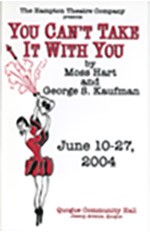
YOU CAN’T TAKE IT WITH YOU
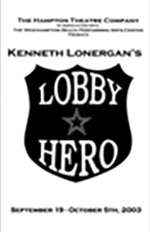
LOBBY HERO
2002 – 2003 Season
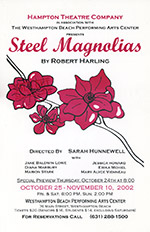
STEEL MAGNOLIAS
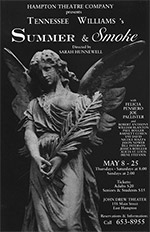
SUMMER AND SMOKE
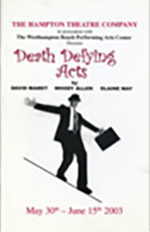
DEATH DEFYING ACTS
2001 – 2002 Season
ALL MY SONS | OF MICE AND MEN | RUMORS2000 – 2001 Season
THE DINING ROOM | IT’S ONLY A PLAY | I OUGHT TO BE IN PICTURES1999 – 2000 Season
AH, WILDERNESS! | ABSURD PERSON SINGULAR1998 – 1999 Season
LADY WINDERMERE’S FAN | SOCIAL SECURITY | THE YOUNG MAN FROM ATLANTA | THE LAST NIGHT OF BALLYHOO1997 – 1998 Season
A DELICATE BALANCE | THE RAINMAKER | SYLVIA | A STREETCAR NAMED DESIRE1996 – 1997 Season
THE LITTLE FOXES | WHAT THE BUTLER SAW | A VIEW FROM THE BRIDGE | BLITHE SPIRIT1995-1996 SEASON
THE SISTERS ROSENSWEIG | ORPHANS | LATER LIFE | ISN’T IT ROMANTIC1994-1995 SEASON
THE CRUCIBLE | THE LAST YANKEE | THE REAL THING | NOISES OFF1993-1994 SEASON
MARVIN’S ROOM | LOVE LETTERS | THE HEIRESS | INVITATION TO A MARCH1992-1993 SEASON
THE NIGHT OF THE IGUANA | PACK OF LIES | LEND ME A TENOR1991-1992 SEASON
MURDER AT THE HOLLOW | HOW THE OTHER HALF LOVES | RUMORS1990-1991 SEASON
THE HO– USE OF BLUE LEAVES | THE FOREIGNER | COASTAL DISTURBANCES1989-1990 SEASON
THE SKIN OF OUR TEETH | THE DINING ROOM1988-1989 SEASON
ONE ACT PLAYS | CRIMES OF THE HEART1987-1988 SEASON
ANASTASIA | DRACULA1986-1987 SEASON
HOT L BALTIMORE | THE MO– USETRAP | GOD’S FAVORITE1985-1986 SEASON
THE DIARY OF ANNE FRANK | THE LONG CHRISTMAS DINNER | A CHRISTMAS CAROL | BEDROOM FARCECopyright © 2025 · All Rights Reserved · Hampton Theatre Company
by DESIGNINGJOE · Log in
 Hampton Theatre Company
Hampton Theatre Company